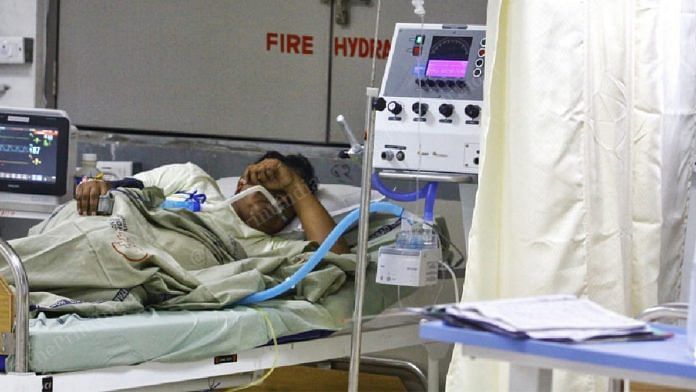New Delhi: A significant proportion of recovered Covid-19 patients suffers from psychiatric disorders such as post-traumatic stress disorder (PTSD), anxiety, insomnia and depression, a new study reveals.
The study — conducted by the San Raffaele Hospital in Milan, Italy — analysed 402 Covid-19 patients, a month after their hospital treatment. The study was published in the journal Brain, Behavior, and Immunity.
Overall, 55.7 per cent of the patients self-reported at least one psychopathological manifestation. Furthermore, 28 per cent suffered from PTSD, 31 per cent from depression, 42 per cent from anxiety, 20 per cent from obsessive-compulsive disorder (OCD) and 40 per cent from insomnia.
Within the 402 subjects, 26 patients had a pre-Covid diagnosis of major depressive illnesses, 28 had generalised anxiety, 20 had panic attacks, five were bipolar, five had social phobia, 3 had eating problems and 4 had other disorders.
“There are some biological changes in the brain after Covid, which in some ways is related to creating psychiatric manifestations,” Dr Soumitra Pathare, director of the Centre for Mental Health Law & Policy ILS, told ThePrint.
“Another theory says that the psychological (fear, panic and anxiety) and social experiences of Covid are responsible for these after-effects. Stigma, discrimination, fear of the future, fear of losing jobs, are some of the many reasons that can lead to psychological problems in patients post-Covid-19,” he added.
Also read: 6 months on, this is what Indian doctors have learnt about Covid and its treatment
Psychiatric symptoms triggered in two ways
Coronavirus can induce psychological manifestations in two ways, one is through direct viral infection of the central nervous system (CNS) and the other is indirect through an immune response.
The study notes that when an infection triggers the immune system, it could add to the psychological stress of enduring a potentially fatal disease and to stress-associated inflammation.
Cytokine storms may also cause psychiatric symptoms.
A cytokine storm occurs when the body’s immune system goes into overdrive, killing healthy cells and causing organ failures. Several studies suggest that a cytokine storm causes lung injury and multi-organ failure.
Severe Covid-19 cases have been known to result in a cytokine storm, which has emerged as one of the common causes of death in patients.
Fear of illness, uncertainty of the future, stigma, traumatic memories of severe illness and social isolation experienced by Covid-19 patients could exacerbate stress in recovered patients.
Also read: More ICU beds, quick action on severe cases — Expert panels on how to check Delhi Covid deaths
Women more susceptible to depression, anxiety
The study shows that women, especially those with a previous psychiatric diagnosis, suffered the most from anxiety and depression. Younger patients also showed higher levels of depression and sleep disturbances.
The researchers observed that while outpatients showed increased anxiety and sleep disturbances, the duration of hospitalisation was inversely correlated with PTSD, depression and anxiety.
According to the study, survivors of earlier outbreaks of coronaviruses such as Severe Acute Respiratory Syndrome (SARS) and Middle East Respiratory Syndrome (MERS) also reported psychiatric symptoms like anxiety, depression and OCD.
Preliminary data also suggests that patients with Covid-19 experience confusion, delirium, depression, anxiety and insomnia while hospitalised.
“People who have suffered from the disease, especially the ones severely affected and had to be admitted, definitely suffer from anxiety levels,” Dr Arnimesh Arya, senior consultant in respiratory medicine at Sri Balaji Action Medical Institute in Delhi, told The Print.
“People feel like they haven’t got rid of the infection completely, and the fear that they might get the disease again. The first question that comes to their mind is, have I recovered fully, do I have enough antibodies and is it likely that Covid can attack me again,” he added.
Also read: 15 days between diagnosis and death for Covid patients in India, fatality data shows



